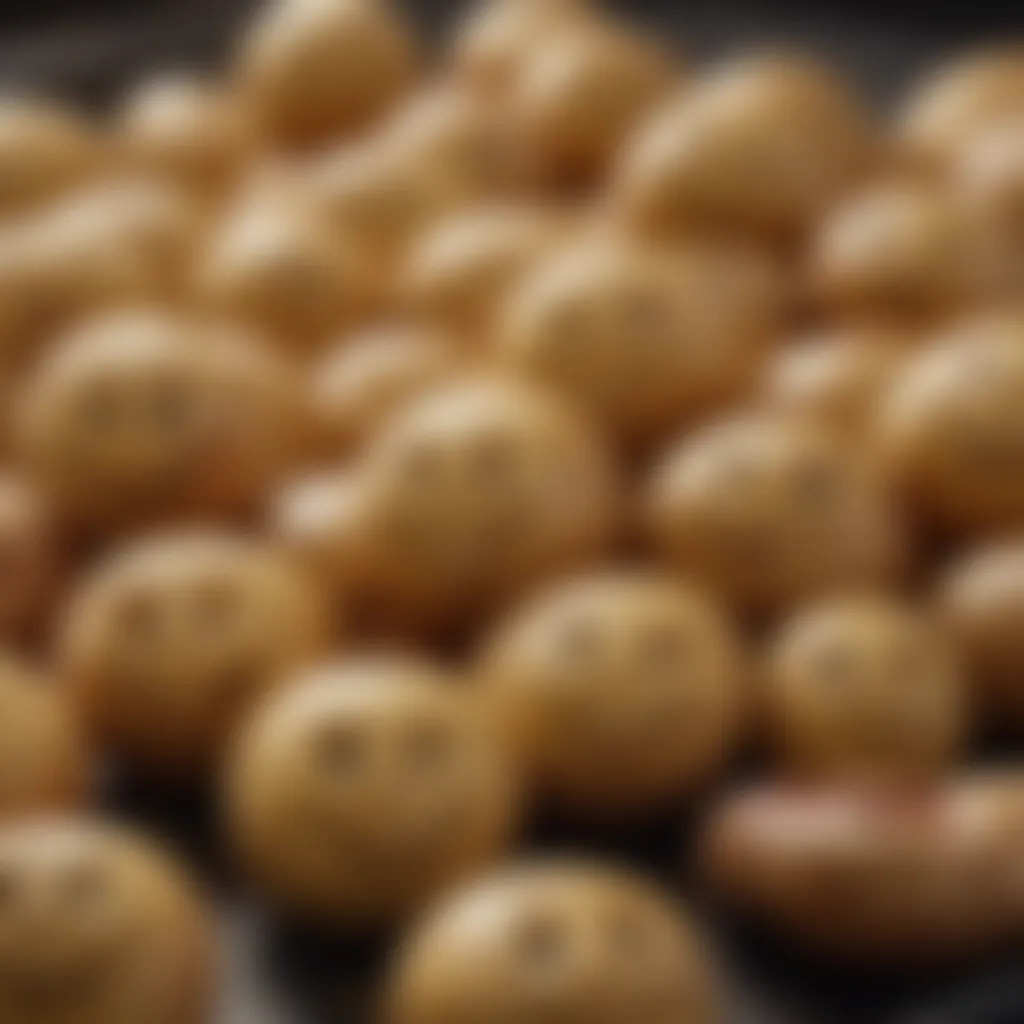Exploring the Cultural and Nutritional Impact of Smiley Potatoes


Intro
Smiley potatoes are more than just a fun side dish, they represent a unique intersection of culinary creativity and cultural significance. Their distinctive face shapes attract children and adults alike, making them a popular choice for family meals. While many may view them merely as a nostalgic comfort food, their implications stretch into areas such as nutrition and family dynamics in cooking. This article seeks to unearth the deeper layers of smiley potatoes, providing insight from various perspectives that highlight their relevance in modern culinary and cultural contexts.
Ingredients:
To make smiley potatoes, here is the list of ingredients you will need:
- 500 grams of potatoes (preferably starchy potatoes such as Russet or Yukon Gold)
- 1 tablespoon of all-purpose flour
- 1 teaspoon of salt (or to taste)
- 1/2 teaspoon of black pepper (adjust per preference)
- 1 teaspoon of garlic powder (optional for flavor)
- 1 tablespoon of cornstarch (to enhance crispiness)
- 3 tablespoons of cooking oil (for frying or baking)
- Water (as needed to adjust the consistency)
Preparation Steps:
- Wash and peel the potatoes thoroughly to ensure cleanliness. This is vital since the skin can harbor dirt and potential pesticides.
- Boil the potatoes in a pot of water until they are fork-tender, which usually takes around 15 to 20 minutes. Be attentive to not overly soften them; they should still maintain some firmness.
- Drain and cool the potatoes slightly. Once cool enough to handle, you can mash them using a potato masher or a fork. It is essential to achieve a smooth texture without lumps.
- Combine the ingredients in a mixing bowl. Add the all-purpose flour, salt, black pepper, garlic powder, and cornstarch to the mashed potatoes. Mix everything until you achieve a uniform consistency.
Technical Aspects:
- Temperature Settings: If you are frying, set the stove to a medium-high heat. For baking, preheat the oven to 200°C (392°F).
- Timing Specifics: When frying, each side typically requires 2 to 3 minutes until golden brown. For baking, cook for 20 to 25 minutes, flipping halfway through for even crisping.
- Critical Techniques: Ensure to cool the mashed potato mixture a bit before forming shapes. This will help in maintaining their structure during cooking.
Cooking Process:
Frying Method:
- Shape the mixture: Form the mashed potato mixture into small patties or oval shapes with an impressively smiley face carved into them, using tools or just your hands.
- Heat the oil in a deep pan. Test if the oil is ready by dropping in a small piece of the potato mix; if it sizzles, you are ready to start frying.
- Fry in batches to avoid overcrowding the pan. Maintain a steady heat throughout the frying process and flip them gently after a few minutes.
- Drain on paper towels after frying to absorb excess oil, ensuring they remain crispy.
Baking Method:
- Prepare a baking sheet by lining it with parchment paper.
- Place the shaped smiley potatoes on the sheet, leaving space between each.
- Brush with oil to encourage browning, then place them in the oven.
- Flip halfway through cooking for even browning and remove when done.
Troubleshooting Tips:
- If your smiley potatoes are too soft, try adding a bit more flour or cornstarch in the mix to help bind them better.
- Should they stick to the pan while frying, ensure the oil is hot enough and do not flip them too early.
- For a more flavorful punch, consider mixing herbs or spices into the potato mash according to your taste preference.
Smiley potatoes symbolize not only comfort but also an opportunity to engage kids in healthy eating habits through fun shapes and textures.
Intro to Smiley Potatoes
Smiley potatoes hold a unique position in contemporary cuisine and culture. They are not just a fun food item; they also embody a connection between culinary innovation and child-friendly dining. Their playful shape and engaging aesthetics make these potatoes particularly appealing to kids and families, often serving as a gateway to more balanced eating habits. Understanding smiley potatoes contextualizes their importance within both culinary and nutritional discussions, revealing their role in shaping preferences and encouraging healthier choices among children.
Definition and Description
Smiley potatoes are typically made from mashed potatoes that are formed into round shapes featuring smiling faces, which often include two eyes and a mouth. They are usually coated with breadcrumbs and then frozen, ready for cooking. This distinctive design helps make a classic food item more playful and appealing, especially to younger audiences. The crispy exterior juxtaposed with a soft and fluffy interior creates an enjoyable texture that adds to their popularity.
The production of smiley potatoes focuses on quality ingredients. The primary component remains the potato itself, which provides the necessary base. Most products are made from different potato varieties, ensuring various flavor profiles and textures. In addition to potatoes, seasonings and flavor enhancers are sometimes added, offering subtle differences in taste.
Origins and Historical Context
The concept of smiley potatoes can trace some of its roots back to developments in frozen foods in the mid-20th century. The commercialization of processed potato products experienced significant growth during this time, as families started to seek convenient meal solutions. Smiley potatoes emerged as a creative way to engage children with their meals, combining both convenience and visual appeal.
Initially, these products were limited mostly to Western markets. However, as global food trends evolved, smiley potatoes began to appear in various cuisines, enhancing their cultural reach. They have now become a staple in many household meals, especially in contexts where families aim to introduce vegetables in more enjoyable forms. The historical context of smiley potatoes highlights both their evolution and acceptance across demographics, reflecting broader changes in eating habits and the influence of consumer demands on food production.
Nutritional Profile of Smiley Potatoes


Understanding the nutritional profile of smiley potatoes is essential to grasp their role in our diets. These playful potato shapes are not only a source of comfort for many but also provide various nutrients that can contribute to a balanced meal. It is important to analyze the caloric content, vitamins, and minerals, as well as the potential health benefits associated with smiley potatoes. This knowledge can inform better choices in family meals and child nutrition.
Caloric Content and Macronutrients
Smiley potatoes typically have moderate caloric content, which varies based on preparation method. On average, a serving can contain around 130 to 180 calories. This count can increase when fried due to the added oils. The main macronutrients present in smiley potatoes include:
- Carbohydrates: Potatoes are primarily composed of carbohydrates, which provide energy.
- Protein: While not a significant source, they do contain a small amount of protein, essential for growth and repair.
- Fat: Generally low in fat, but fried versions can have higher levels, depending on the oil used.
These macronutrients play important roles in maintaining energy levels and overall health. However, it is crucial to moderate portions—particularly fried ones—to maintain a balanced diet.
Vitamins and Minerals
Smiley potatoes are a source of several vitamins and minerals. They are particularly rich in:
- Vitamin C: This vitamin supports the immune system and has antioxidant properties.
- Vitamin B6: Important for protein metabolism and the formation of neurotransmitters.
- Potassium: Contributes to muscle function and helps regulate blood pressure.
Additionally, smiley potatoes contain small amounts of several other nutrients, which can contribute to the overall nutrition of a meal, particularly if served with rich toppings or dips.
Potential Health Benefits
The health benefits of smiley potatoes can be linked to their nutrient profile and preparation methods. When enjoyed in moderation, they can:
- Provide a source of energy for both children and adults.
- Contribute to the intake of essential vitamins that support overall health.
- Help satisfy cravings for comfort food while also offering nutritional value.
- Encourage better eating habits in children due to their appealing shape.
"Smiley potatoes can serve as a bridge between enjoyment and nutrition, especially for children who may be picky eaters."
Culinary Applications
The culinary applications of smiley potatoes extend beyond mere novelty. They provide an opportunity to enhance the eating experience, especially for children. Their unique shape and design capture attention, making them an appealing choice for families. This section will address preparation methods and serving suggestions, highlighting their significance in everyday meals.
Preparation Methods
Frying Techniques
Frying smiley potatoes is a common method, bringing a satisfying crunch to their soft interior. The process typically involves deep frying or pan frying in oil. This contributes a distinctive flavor, often enriched by the frying medium. Since frying is quick, it can suit busy home cooks well. However, this method can lead to a higher caloric content due to oil absorption. Thus, it is essential to consider moderation when including fried smiley potatoes in a diet.
Key feature: Frying enhances texture and flavor.
Advantages: Quick preparation, appealing taste.
Disadvantages: Higher in fat and calories.
Baking Options
Baking smiley potatoes offers a healthier alternative to frying. This method allows for a crispy exterior while retaining moisture inside. It is often complemented by a sprinkle of spices that can enhance the overall taste. The unique aspect of baking is its ability to minimize added fats while still achieving a delightful crunch through proper cooking techniques.
Key feature: Baking maintains a moisture balance.
Advantages: Reduced calories, customizable flavor.
Disadvantages: Longer cooking time compared to frying.


Serving Suggestions
Accompaniments
Pairing smiley potatoes with various accompaniments elevates their role within a meal. Common sides include dips like ketchup or mayonnaise, which enhance flavor and appeal. Other potential accompaniments are salads or grilled vegetables. These pairings provide balance to the meal, making it suitable for both children and adults.
Key feature: Range of dipping options personalizes the dining experience.
Advantages: Versatile pairing options.
Disadvantages: May lead to paired items that are not always healthy.
Presentation Styles
The presentation of smiley potatoes can be crucial for appealing to children. Creative arrangements on the plate can stimulate interest, encouraging kids to try different flavors. Unique presentation, such as using colorful plates or adding garnishes, makes the meal more visually striking. This aspect is especially important as it plays a role in shaping children's eating habits.
Key feature: Creative designs engage children’s interest.
Advantages: Improves likelihood of consumption.
Disadvantages: May require extra effort and time for preparation.
Smiley potatoes are not just food. They engage darkity, stimulate creativity, and promote inclusive sharing during mealtime.
Cultural Reception and Perception
Understanding the cultural reception and perception of smiley potatoes is crucial in comprehending their role in society. Such analysis does not solely pertain to taste and aesthetics but delves into how these food items resonate across various communities. This inquiry reveals how smiley potatoes serve as a medium of connection within families and between cultures. Their playful appearance invites individuals, especially children, to engage with their meals. This engagement fosters a positive environment around dining, contributing to the overall experience of eating.
Cultural Significance in Different Regions
In different parts of the world, smiley potatoes reflect distinct cultural narratives. In Western countries, they are often seen as a fun addition to family meals. The USA and the UK have integrated smiley potatoes into children's menus, linking them with nostalgia for childhood. They often appear at birthday parties or festive celebrations, symbolizing joy and lightheartedness.
In some Asian countries, the appeal may relate to the growing acceptance of Western food influences. Here, smiley potatoes sometimes appear alongside traditional dishes, created to enhance the dining experience. Though they are not a staple, their presence signifies an openness to incorporating global food trends into local cuisines.
The cultural significance of smiley potatoes extends beyond the plate. They embody the adaptation of culinary practices and consumer preferences, showcasing how a simple product can foster companionship and joy, transcending geographical boundaries.
Impact on Child Nutrition and Eating Habits
Smiley potatoes may positively influence children's eating habits. Texture and design play a major role in how meals are perceived by young eaters. The fun shapes can make eating vegetables and starches more appealing. This is particularly important for parents who struggle to encourage their children to consume a balanced diet.
"Visual elements in food can enhance children's willingness to try new things."
For many parents, the introduction of smiley potatoes acts as a bridge, leading children to explore vegetables they might avoid otherwise. The playful form can make the experience of eating more enjoyable, thus encouraging children to engage with their food.
Research indicates that incorporating fun food designs promotes better eating habits. Hence, targeting the aesthetic aspect is essential in motivating kids to approach nutritious items positively. Smiley potatoes exemplify how culinary creativity can support healthy choices. In this sense, they represent more than just a food item; they are a tool that aids parents in making nutrition exciting.
Manufacturing and Industry Perspective
Understanding the manufacturing and industry perspective is vital in recognizing how smiley potatoes fit into both culinary and cultural frameworks. This section will explore key production processes and current market trends, emphasizing their implications within the food industry and for consumers, particularly families.
Production Processes


The production of smiley potatoes involves several carefully orchestrated steps. Initially, high-quality potatoes are selected based on size, shape, and texture. Varieties such as Russet or Yukon Gold are often favored for their starchy quality, which contributes to the end product's flavor and texture.
Once selected, these potatoes undergo washing and peeling. This stage is notable because it ensures that only the best potatoes are processed further. Following this, the potatoes are cut into the iconic smiley shape using specialized machinery designed for precision and consistency.
Blanching is a critical phase in the process. This involves briefly boiling the shaped pieces, followed by rapid cooling. This method not only locks in color and nutrients but also enhances the smiley potatoes' final texture. After blanching, the potatoes are frozen or dehydrated, which extends their shelf life significantly. Manufacturers aim to maintain product quality throughout the entire process, from selection to freezing.
In terms of food safety, rigorous standards are in place. The facilities must comply with regulatory requirements to ensure that the smiley potatoes are safe for consumption. Quality checks are frequent, ensuring that all products meet stringent health regulations before they reach retail shelves.
Market Trends and Consumer Demand
As the food landscape evolves, smiley potatoes have adapted to stay relevant. An increasingly health-conscious consumer base seeks out products that offer more than just basic nutrition. As a result, trends favor smiley potatoes fortified with vitamins and minerals. Many companies are now incorporating added nutrients, positioning their products as a better choice for families.
The demand for convenience foods is another significant trend. Parents often look for easy-to-prepare meals that do not compromise on taste or quality. Smiley potatoes fit well into this market; they can be prepared quickly, making them an excellent choice for busy families. Furthermore, the playful design appeals to children, encouraging them to engage more with their meals.
In the retail environment, smiley potatoes are presented in multiple formats, such as frozen options and packaged ready-to-cook varieties. Companies are conducting research to monitor shifts in consumer preferences. Products are increasingly advertised not just for their taste but also for their nutritional benefits.
"The rise of convenience has led to a resurgence in products like smiley potatoes, which seamlessly blend fun, nutrition, and ease of preparation for families."
Overall, the manufacturing and industry perspective provides valuable insights into how smiley potatoes are produced and marketed. Understanding the production processes and current market dynamics aids in appreciating their position in modern diets, especially among families.
Environmental Considerations
Environmental considerations in the culinary and cultural contexts of smiley potatoes are crucial for understanding the broader impact of potato farming and processing on our planet. The cultivation of potatoes, in general, involves various environmental factors that can influence sustainability and ecological balance. It is essential to explore these factors as they affect not only the production of smiley potatoes but also the preservation of natural resources and biodiversity. The discussion here delves into two significant aspects: the sustainability of potato farming and the environmental impact of processing.
Sustainability of Potato Farming
Sustainability in potato farming refers to methods and practices that minimize environmental degradation while maximizing crop yield and quality. Various farming techniques can enhance sustainability. For instance, crop rotation plays a vital role in maintaining soil health. Rotating potatoes with legumes helps fix nitrogen levels, thus enriching the soil. Additionally, organic farming practices such as natural pest control and avoidance of synthetic fertilizers enable a more eco-friendly approach.
Another important aspect is water management. Efficient irrigation systems can greatly reduce water wastage. Some farmers have adopted drip irrigation, which delivers water directly to the roots, ensuring that crops receive just the right amount. Furthermore, sustainable farming promotes biodiversity by preserving native plants and animals in agricultural zones.
The shift toward sustainable practices in agriculture can lead to improved soil fertility, less dependency on chemical inputs, and ultimately a healthier environment.
Impact of Processing on the Environment
The processing of smiley potatoes is another crucial area to consider when discussing environmental effects. Processing involves several stages, from washing and cutting to freezing and packaging. Each stage consumes energy and resources, contributing to the overall ecological footprint of the product.
For example, energy consumption during processing can often lead to a significant increase in greenhouse gas emissions. Manufacturers are now trying to adopt renewable energy sources in their processing plants to combat this issue. This shift helps reduce reliance on fossil fuels and lowers the carbon footprint associated with potato products.
Additionally, packaging methods are being reevaluated for their environmental impact. Some companies are increasingly using biodegradable or recyclable materials to minimize waste. This is a notable trend as many consumers are becoming more environmentally conscious.
In making informed choices about food products like smiley potatoes, consumers can encourage practices that contribute to environmental sustainability.
Culmination and Future Directions
The exploration of smiley potatoes is significant not only due to their distinct shapes and flavors but also because they encapsulate broader themes in culinary and cultural dynamics. Understanding their journey from production to consumption provides insights into changing dietary preferences and social interactions. Parents often find smiley potatoes appealing as they can engage young children in mealtimes, transforming what could be a mundane meal into a playful experience. Furthermore, these products reflect market responses to consumer desires for convenience and nutrition.
Future directions in the study of smiley potatoes could involve several dimensions. First, an analysis of their role in global diets is essential. As culinary preferences evolve, it would be beneficial to understand if smiley potatoes feature prominently across various cultures beyond their current niche. Secondly, given the increasing attention on health, research could focus on the nutritional profiles of smiley potatoes specifically, emphasizing ways to enhance their health benefits while maintaining their allure to children.
Another interesting avenue is the sustainability of their production. As environmental concerns grow, studying the ecological impact of smiley potato farming and processing will provide valuable insights for both manufacturers and consumers. Exploring these aspects will not only illuminate the future of smiley potatoes in the market but also position them within the larger framework of responsible consumption and sustainable practices.
Overall, assessing the significance of smiley potatoes goes beyond taste; it invites a deeper conversation about culture, nutrition, and environmental stewardship.
Summary of Key Points
- Smiley potatoes serve as a bridge between fun and nutrition, appealing to children and parents alike.
- Their popularity indicates changing consumer preferences, reflecting a demand for convenience in food products.
- Further research opportunities lie in their cultural significance, health value, and sustainability of production methods.
Future Research Opportunities
- Investigating the prevalence of smiley potatoes in global diets.
- Assessing and enhancing the nutritional profile of smiley potatoes for different demographics.
- Analyzing environmental impacts related to potato farming and processing in context to market demand.
- Exploring innovative preparation methods that maintain taste while improving health benefits.







